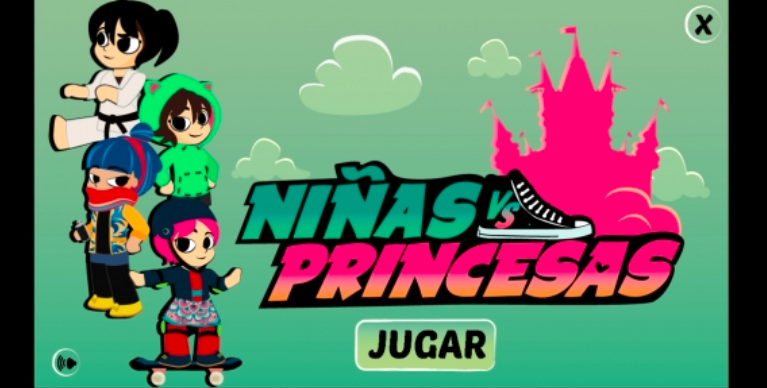
Screenshot from Bolivian video game “Girls vs. Princesses” which aims to combat female stereotypes developed in childhood.
This post by Mabel Franco was published originally in La Publica and reproduced under a content sharing agreement.
Its proponents say it is more than a game, that it is a virus seeking to expose prejudices, remove imbalances, and hack a world where Disney Princesses exercise dictatorship over girls.
The virtual game “Girls vs. Princesses”, was masterminded by the La Paz-based communications agency Nicobis that “develops programs in film, video and mutimedia and specializes in publishing children's literature.” In the game, characters jump and run to avoid being qualified as a princess according to the “princess meter”.
Via its company branch PICA (Smart Programs for Teenagers), Nicobis is seeking to diversify its market in Bolivia, creating applications and virtual games that exploit growing market niches in a sustainable way. The “Girls vs Princesses” game was funded by the Dutch development organisation Hivos*, and will be available free of charge when it is released in two months time.
After tests with focus groups and subsequent modifications, “Girls vs. Princesses” will be exhibited at the La Paz International Book Fair later this month (August 5 -16), where it will be played on a Wi-like machine that reads real physical movements.
There, at a stand embellished in the style of a teenager's room, girls of all ages will be able to play the stereotype-busting game on a big screen, attempting to escape the mainstream-driven image of perfection associated with young, white/blond, thin girls, dressed in mostly pink costumes and dreaming of the love of a handsome prince.
Emiliano Longo, Nicobis's creative director, is also a father. He has a three-year-old girl “who sometimes I call ‘princess’ and then I want to bite my tongue”.
What concerns Longo most, however, is that his little girl wants to be a princess, no matter what her parents tells her, and has already internalized the princess concept: she doesn't want to dress in any colour but pink, and loves to wear her mother's high heels.
“Do you know what? We are formatted,” concludes Longo, who created the game “Girls vs. Princess” along with illustrator Mónica Carreño, game and application developer Enrique Oropeza and fellow creative director Carlos Mercado.
Game on
The game has two levels: a basic one, consisting of running and jumping for little girls, and a more advanced level with obstacles, high jumps and other difficulties for teenagers.
Players can choose what their alter ego is going to look like. You can create your character on the screen and choose their skin colour (from white to purple or any other colour), the hair color and style (whether blond and straight or blue and curly) and dress the character as you see fit.
Popular archetypes include karate girls, skater girls, graffiti artists and scientific researchers among others. Only the ‘princess’ look is off the menu.
As the game starts, characters proceed through a forest, a party room and a castle, with the goal of trying to avoid being trapped by the makeup an irritant fairy seeks to smear on the player.
Other hazards players must negotiate are the corseted and pompous figure-hugging dress — it is hard to jump dressed like that — a pink wardrobe that attacks by throwing high heeled shoes at the player, and, ultimately, the kiss of an obnoxious prince.
With a team of allies encompassing books, paint brushes, balls and other functional objects that save girls from being pigeonholed, players aim to keep their score on the “princess meter” as low as possible.
If they cannot, they risk becoming the hated princess herself. Falling into the arms of the prince means game over.
Poor Princesses?
But since the game's premise is a non-discriminatory one, the question arises: Who will defend the princess’s rights?
The team's answer is merciless: for a century, Disney, the movies and the entertainment industry have all defended the princess's rights. Now, her time has come.
Longo believes the princess concepts internalized by girls “and their mothers” — not to mention the associated values — are nothing but sales strategies to promote consumption.
The ‘princess’ brand, he says, has been a boon to toy manufacturers, producers of clothes of a certain colour and style, “girl” makeup and other gimmicks.
This also contributes to the early sexualization of young girls and pushes them to act in a certain way to please men.
In the focus groups Nicobis ran, it became clear that girls were strongly attracted to the game, that they found the princess idea pathetic, had ambitions to be athletes or scientists and considered girls that behave like princesses ridiculous.
Those responses convince the game's makers they have found a winning tool to combat prejudice.
Boys, however, resented the fact that the game's hero is a woman, meaning that few are likely to play the game, says Enrique Oropeza.
Monica Carreño notes that games where women have leadership roles are few and far between, while female computer game characters are mostly designed to appeal to men:
“I always wondered why women fighters are almost nude and fighting in bikinis, while her male teammates appear behind heavy armor,” she laughs.
The “Girls vs. Princess” game has already taken over six months of work and is slated to be ready by the beginning of October.
Whoever wants to play it will be able to download it from websites in Bolivia and other countries, or find it on Playstore and AppStore.It will also be distributed in schools along with other educational and recreational materials from PICA.
At the upcoming Book Fair Bolivian teenagers will be jumping real jumps to help their chosen characters escape the pink tyranny on a giant screen. The princess's days appear to be numbered.






